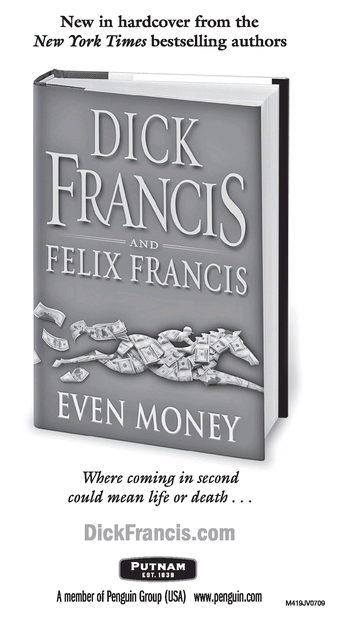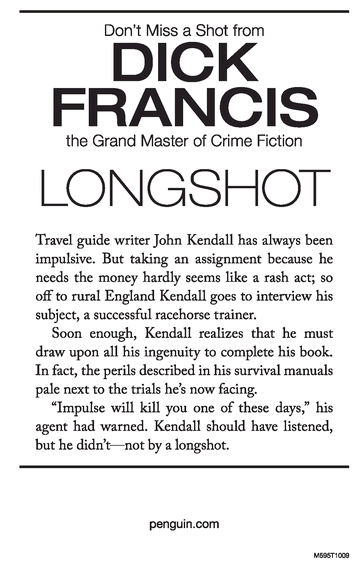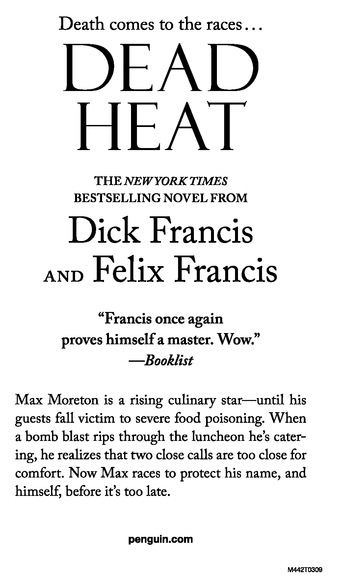Comeback (39 page)
Authors: Dick Francis

Still as if nonplussed at things not going to plan, he bent down with his back to me to retrieve the fallen cap, and I, still futilely swinging, drew up my arms and knees and launched my feet with total desperation at Carey’s backside.
The force of the connection was only slightly dissipated in the cloth of the surgical gown—no gloriously accurate success like Vicky’s kick at the mugger—but it was hard enough to overbalance him, hard enough to send him staggering forward, and hard enough for him to crash his forehead against the sharp metal corner of one of the cabinets before he could straighten up.
He collapsed in a heap, stunned.
Feverishly I fought to undo the buckles of the constricting cuffs. I undid the left cuff first without thinking it out, as it was the one I’d tried to undo earlier. That wasn’t too difficult, but it left me swinging from my right wrist alone, and undoing those buckles left-handed and up high cost enormous muscular effort. Sheer extreme panic gave me a strength beyond knowledge, a brute force like madness.
I sweated. Groaned. Struggled. Made my fingers overcome the opposing force of my weight.
My hands slid free at last and I fell, landing awkwardly, off balance, staggering, thinking immediately of a weapon, looking around for something to hit Carey’s head with if he should stir, something to tie him with if he didn’t.
Hurry. Hurry.
The solution was fitting and blindingly simple. I pushed the hoist buttons in my turn, lengthening the chains, still clipped to the cuffs, to their full extent. Then, very carefully, because of tetrodotoxin still a pinprick away, I pulled Carey’s arms out from beneath him and bent them behind his back and fastened the cuffs to his wrists, but cross-buckled them so that they were held together, harder than ever to undo. He had a pulse. It throbbed in the wrists. Better, I thought, if he’d died.
I went to the controls and by degrees shortened the chains until they were just tight enough to lift Carey’s latex glove-covered hands two or three inches clear of his back. When he woke in that position, he’d scarcely be able to pick his head off the floor.
Satisfied for the moment, but suffocating with anxiety, I ran into the padded room and over to Annabel.
She slept. I felt her pulse too. Strong enough. Alive. “Oh Annabel.” I smoothed her hair, overwhelmed with feeling.
I felt like crying. Heroes who took six punches in the solar plexus and came up smiling never felt like crying.
I stumbled unsteadily back to the office and sent a telephoned SOS to Ramsey to arrive with reinforcements. Went back to Annabel, sitting down beside her weakly with my back against the bullring wall, watching Carey through the sliding door for signs of murderous consciousness.
I held Annabel’s hand, seeking comfort for myself as much as to give it.
She was alive. She would awake, as I had.
She had to.
I loved her intensely.
No trap I could have devised would have revealed Carey as conclusively as the one he’d set for me.
Between intuition and probability I’d come to see that it had had to be Carey I was looking for, but until he’d attacked me I’d had no way of persuading anyone else to believe me. Carey was the grand old man, the father of the practice, the authority figure, the one respected and trusted above all others by the clients.
All those old men. His generation. All knowing each other for half a lifetime. All knowing the secrets.
Long ago, Ronnie Upjohn’s father and Theo Travers’s grandfather had been insurance agents who’d made a fortune, not the average state of affairs.
Long ago, Kenny McClure had ordered tetrodotoxin in order to pass it to the iniquitous Mackintosh, who everlastingly played cards with Carey. It was Carey, I judged, who’d persuaded Kenny, a vet but not his partner, to acquire the poison, and Kenny, balking at what he’d done, had got shot for his pains.
Long ago, Wynn Lees had stapled an enemy’s pants to his privates; had done his time and had gone to Australia.
The present troubles had begun after Wynn Lees’s return, and perhaps he’d been the trigger that restarted the engine.
Carey had to have needed money. Not impossible that in the Porphyry crash he’d lost the savings that were to see him through old age. Not impossible to suppose he’d tried to get them back by using his professional knowledge.
Not impossible to guess that he’d somehow persuaded the third-generation insurance man Travers to join him in growing rich, nor that Travers had wanted out like Kenny, and found that out meant dead.
Carey, I thought, had burned the building not just to postpone or avoid identification of Travers, but also to cover all his own tracks. Orders, invoices, all the telltale paperwork had conveniently gone up in smoke, and particularly—I saw with awe—the blood samples taken that day when the cannon-bone horse was dying on the table. Those samples would have shown excessive potassium. The unexplained deaths in the operating room would suddenly have been explained. The hunt for the culprit would be on.
No one would ever have questioned Carey’s going in and out of the storeroom where the intravenous drip fluids were kept. No one would ever question what chemicals Carey ordered. No one would think it odd if he went to see old friends and their horses, no one would worry if he were seen at Eaglewood’s one night, checking on his patients while surreptitiously taking insulin with him.
Carey could go where he liked, do what he liked, unquestioned and unchallenged, unsuspected. After all, no senior veterinarian in his right mind would set out to destroy his chief surgeon’s reputation, nor kill off a practice he’d spent a lifetime building. But Carey, I thought, had meant to make his money and go. Events had hurried him: Travers had precipitated the fire. Ken had saved the colicky mare from what should have been curtains. It had been necessary, from Carey’s point of view, only to finish off the mare and close the mouth of the man who’d carried the poison. After that there was nothing to keep him and he’d smartly announced the end of the partnership. If Ken hadn’t told him how much we’d found out, he would quite likely have been peacefully packing at the moment, rich again and ready to emigrate, not lying flat, facedown in ultimate disaster.
Annabel stirred.
I felt enormous, heart-swelling thankful relief. I squeezed her hand and though she didn’t squeeze back I thought that by then she could probably hear.
“Don’t worry,” I said, “I’m right here beside you. You’re going to be all right very soon. Some bloody madman popped a bit of anesthetic into you but you’re coming out of it and everything’s fine. Don’t hurry. Things will improve very soon, I promise you.”
I went on trying to reassure her and in the end she opened her eyes and used them for smiling.
By the time Ramsey arrived, she was sitting snuggled in my arms but shivering with apprehension that the still prostrate figure in the surgical gown would come to life, jump up and still do us harm. He had jumped out at her from behind the wall, she said. She’d caught a horrified glimpse of him before he’d jabbed the needle into her neck.
“If he comes to life,” I said, “I’ll shorten the chains to pull his arms higher behind his back. I’ll bend him double.”
“I don’t like it.”
Nor did I. It seemed an age before the burly Superintendent appeared inquiringly through the door from the passage and stared in astonishment at the man on the floor.
I stood and went to meet him.
“What exactly gives?” he asked.
“I think,” I said, “that that’s your murderer. And be careful, because under him or nearby there’s a hypodermic syringe oozing something that may be very detrimental to your health.”
A WEEK LATER, I phoned my mother and told her most of what had happened. Not Russet Eaglewood, not too much about Scott, not my frantic fight for life.
At the end she exclaimed, “I can’t believe a vet would kill horses!”
“Vets put down horses all the time.”
“That’s different.”
“Not so very.”
“He must have been warped!”
“Oh, yes,” I said.
I thought of Carey as I’d briefly seen him last, lying securely strapped to a stretcher with a big swelling on his forehead. Eyes closed. Harmless-looking. I heard later that he’d woken up concussed and been bewilderingly calm ever since. “He’s relieved, I reckon,” Ramsey said in a burst of unusual chattiness. “They’re often relieved when it’s all over. Funny that.”
A syringe bearing traces of anesthetic had been found on the floor behind the half-wall in the padded room.
The syringe, whose needle Carey had tried to stick into me in the theater, had rolled under a nearby table. Wary analysis proved the contents of that one to be indubitably tetrodotoxin. The empty ampoule, bearing the Parkway company’s name and batch number in black letters and “Extremely Hazardous” in red, lay in the kidney dish that had held the syringe.
“Smoking gun,” Ramsey said with satisfaction.
His search of Carey’s house revealed a book on dangerous marine animals, among which puffer fish took a medal.
“Circumstantial,” Ramsey said.
Ramsey’s list obtained from Porphyry Place showed Carey to have lost a sum that made me wince.
Higgins’s insurance friends came up with every dead horse on our list: agent each time, Theodore Travers; recipients mostly fictitious, but also Wynn Lees, Fitzwalter and Nagrebb.
The expedited report on the DNA matching of the mare and foal with Rainbow Quest came back negative: nowhere near a match, he wasn’t the sire, positively not. Wynn Lees, certain to be charged with fraud, had cannily skipped the country.
My mother said, “What about Ken?”
“I had to tell him I’d lived here as a boy. He’s wondered all the time how I knew so much.”
“You didn’t tell him about me and his father?” she asked anxiously.
“No, not a word. It’s better not known.”
“Ever the diplomat,” she said, teasing but relieved.
Ken and Belinda’s wedding, I told her, was going ahead as planned. “And that’s just the word for it—planned. They’re both so
practical
about it. No spark. But no doubts either, it seems.”
practical
about it. No spark. But no doubts either, it seems.”
“Don’t you give it much chance then?” she asked, sounding disappointed.
“Fifty-fifty, I’d say. But Belinda’s started calling her mother Vicky, not Mother. That might make all the difference.”
My own mother chuckled. “You said I would like Vicky.”
“You’ll love her.”
“We’ll never meet.”
“I’ll see you do.”
Ken himself, I told her, would emerge with his reputation in most part restored.
“There will be people,” I said, “who might say he should have realized sooner why the horses were dying during operations. I can’t judge that, not being a vet. But it looks like being all right in general. The partners all met and decided to carry on at once and sort out the legal details later, and the practice is renamed McClure Quincy Amhurst, which should steady the critics.”
“Wonderful!”
“And Mum,” I said, “your Kenny . . .”
“Yes?”
“I found out why he died.”
There was a silence on the line, then she said, “Tell me,” and I told her the theories, and that Josephine believed them and was comforted.
“Are your theories right?”
“Yes, I think so.”
A little pause. A voice gentle on a breath, “Thanks, darling.”
I smiled. “Do you want a daughter-in-law?” I asked.
“Yes! You know I do.”
“Her name is Annabel,” I said.



Other books
Bayon/Jean-Baptiste (Bayou Heat) by Wright, Laura, Ivy, Alexandra
Sexy Girls by Gary S. Griffin
The Lying Game by Sara Shepard
Beautiful Broken Mess by Lauren, Kimberly
Haweswater by Sarah Hall
Bad Things (Tristan & Danika #1) by Lilley, R.K.
No Wok Takeout by Victoria Love
The Warrior Bride by Lois Greiman
Testimonies: A Novel by O'Brian, Patrick
Hunter Kiss: A Companion Novella by Marjorie M. Liu
